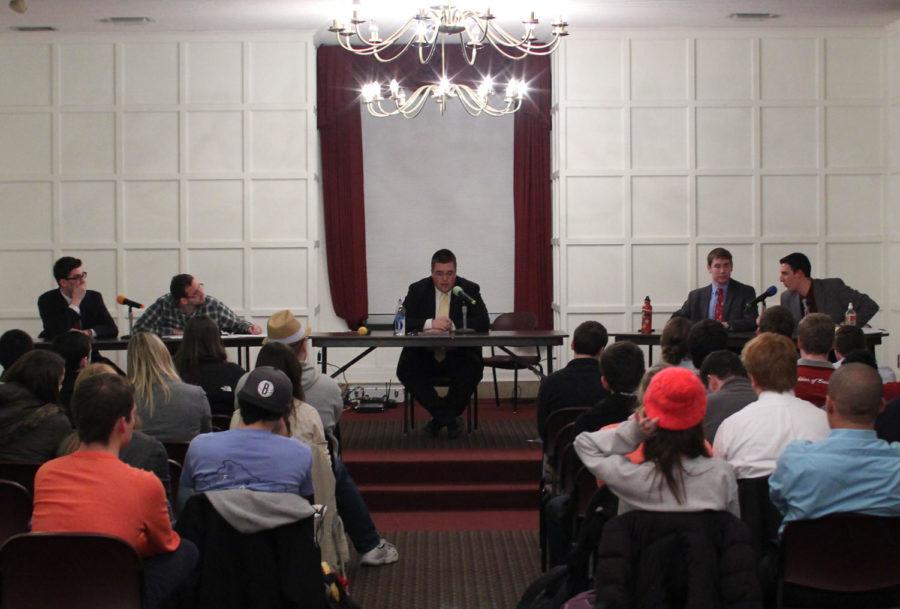Editorial: GSB elections don’t garner student attention
Miranda Cantrell/Iowa State Dail
Candidates square off during the Government of the Student Body vice presidential debate in the Memorial Union on Feb. 17. Despite the important role the organization plays in university affairs, GSB meetings and elections generally do not garner much attention from students.
February 18, 2014
On Monday night, Iowa State’s Government of the Student Body showcased its vice presidential election debate in the Memorial Union’s Cardinal Room. Gabriel Walsh, Michael Hoefer, Nick Lafrenz and Nathan Vos all squared off to answer questions regarding their views on important topics for Iowa State’s GSB. These included questions regarding diversity on campus and in student government, what the candidates thought the most challenging aspect of the vice presidential office would be and what reforms they would push for in GSB.
In addition to Monday’s vice presidential debate, the GSB election commission will be holding a debate for presidential candidates in a little over a week on Feb. 27. These two debates, along with the considerable campaign efforts of the various candidates, allow for the students of Iowa State a relatively clear and extensive view of those that are running for the executive positions of our GSB.
Even with these efforts, far too few students avail themselves of the opportunity to have a voice in how their campus is governed. The winners of last year’s presidential election, Spencer Hughes and Hillary Kletscher, garnered only 1,519 votes out of our University’s more than 30,000 students. For those unaccustomed to computing arithmetic mentally, this means that Iowa State’s student president and vice president were elected by just over 4.5 percent of the available electorate.
The vice presidential debate was attended by around 30 students, although a full video of the debate is available online at the Daily’s website.
While it is up to each student to decide if they wish to become involved in GSB elections, it can easily be seen as a problem that so few students elect to participate in meaningful decisions as to the direction their university will take.
According to Adam Guenther, GSB election commissioner, there are several reasons as to why so many students decide not to participate in the elections. Among these, Guenther said, is that GSB doesn’t “take the time or money to publicize” their efforts. This was a big topic in the debate, as the various candidates continually pointed out that more needs to be done by the GSB leadership to foster communication and relationships with all of the students of Iowa State.
It is often easy to forget that even though many of us may not be aware of all of the projects and initiatives that our student government pursues, they still exist. This past year our sitting GSB president, Spencer Hughes, has pushed for executive compensation reform, which, according to Iowa State’s GSB website, has “put roughly $35,000 directly back into student organization funding.”
Each of the vice presidential candidates and their running mates have entered the presidential race because they have a message to send. It would be a shame for the students of Iowa State to remain deaf to these messages. Becoming more aware of the current elections and the candidates is a start, but taking the time to attend the occasional GSB meetings and being proactive in approaching our student representatives is something that all of us can do to increase the effectiveness of our campus government.







